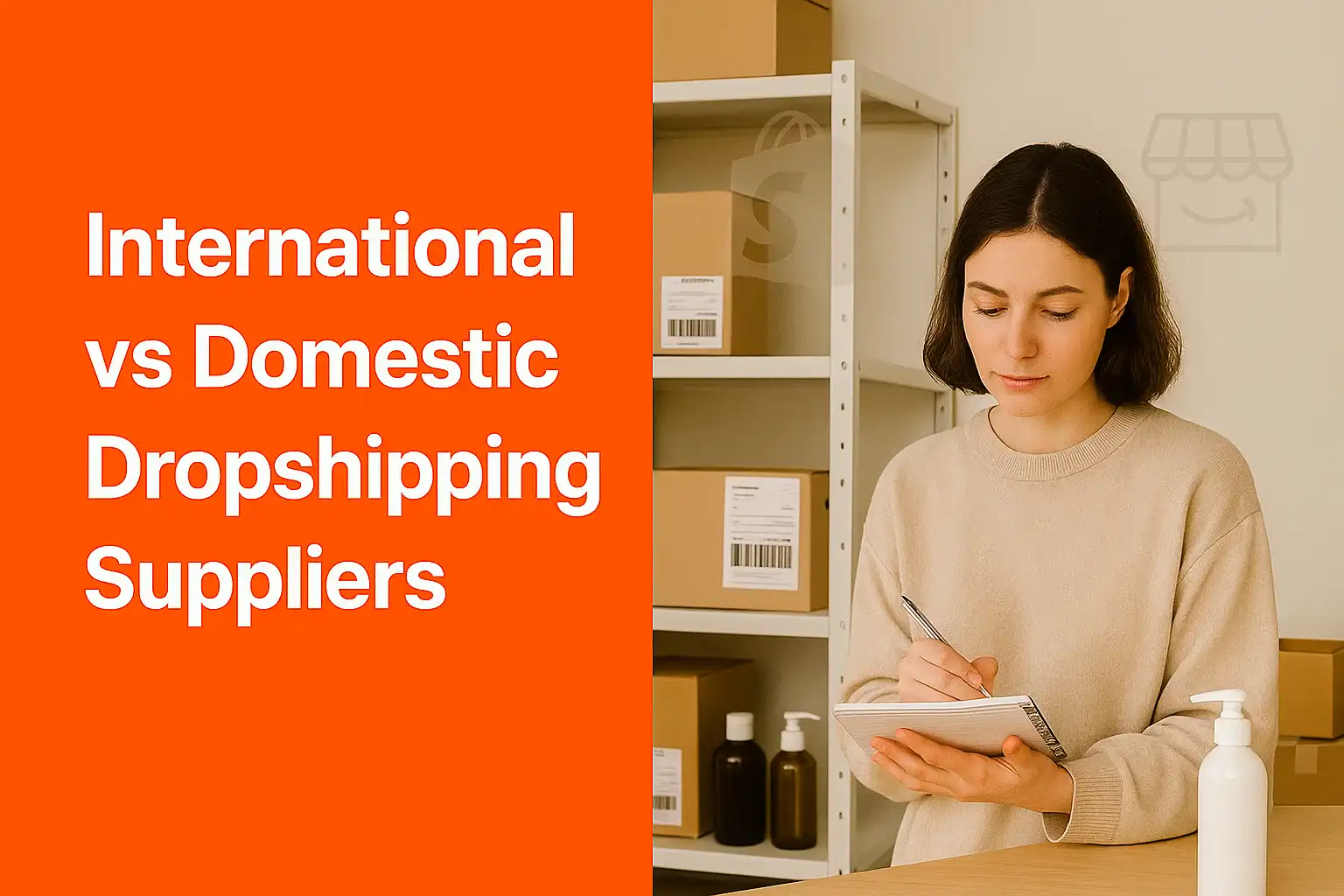Starting a dropshipping business comes with one key question: should you source products from international or domestic suppliers? Both paths can help you build a profitable online store, but the right choice depends on your goals, customers, and long-term vision.
In this guide, I’ll explain the differences, show you the pros and cons, and share practical tips to help you decide which supplier type fits your business best.
What Are International and Domestic Dropshipping Suppliers?
Dropshipping suppliers are third-party businesses that store, pack, and ship products to your customers. You list their items in your online store, and when a sale comes in, they handle the fulfillment.
International suppliers are usually located overseas, often in China, India, or other low-cost regions. Domestic suppliers are based in the same country as your customers, such as the United States, UK, or Australia.
How international suppliers operate
They connect you with a huge range of low-cost products. Many of these suppliers work with AliExpress, Alibaba, or private platforms. They can fulfill orders worldwide, but shipping takes longer.
How domestic suppliers operate
They stock products locally. Orders reach customers faster, but prices are often higher because of labor and logistics costs in that region.
Why this choice matters
Your supplier type affects shipping times, customer satisfaction, return rates, profit margins, and even how easy it is to scale your business.
Advantages of International Dropshipping Suppliers
Working with global suppliers gives you access to variety, lower prices, and bigger scaling opportunities.
Wide product variety
International suppliers often provide millions of items across every niche imaginable. From fashion to gadgets, you can test products quickly without committing to large upfront inventory.
Lower base cost
Because production costs are cheaper overseas, you usually get higher margins. This gives you room to experiment with ads or run discounts without hurting profits.
Easy to scale
Many overseas suppliers have huge warehouses and can handle thousands of orders daily. If your store grows quickly, they can keep up with demand.
Direct manufacturer access
You may even deal directly with factories. This lets you negotiate prices, request variations, or find trending items before they become mainstream.
Advantages of Domestic Dropshipping Suppliers
Domestic options are often chosen by sellers who want speed and trust over variety.
Faster shipping times
Customers today expect quick delivery. Domestic suppliers can often deliver within 2 to 5 days, compared to 2 to 4 weeks for many international shipments.
Better quality control
Local suppliers usually follow stricter standards. Products pass through fewer checkpoints, lowering the chances of defects or damaged packaging.
Stronger customer trust
Seeing a local return address builds confidence. Customers are less worried about scams or long waits, making them more likely to buy.
Easier returns and support
Domestic suppliers simplify returns, refunds, and replacements. Instead of shipping items across the globe, products can be sent back locally at a fraction of the time and cost.
Key Differences Between International vs Domestic Dropshipping Suppliers
Both models have strengths and trade-offs. Let’s break it down.
Shipping speed and costs
International shipping is cheaper but slower. Domestic shipping is faster but costs more, often leading to higher retail prices.
Product availability
International suppliers have a larger selection and often release trending products faster. Domestic suppliers may carry fewer items but focus on quality and reliability.
Margins and profit potential
Lower international prices allow higher margins, though you risk refunds due to delays. Domestic suppliers limit your margin but reduce refund requests and complaints.
Brand perception
If your brand needs fast service and strong packaging, domestic partners help. If your goal is variety and testing products quickly, international partners win.
Choosing the Right Dropshipping Suppliers for Your Store
The decision depends on your niche, customer base, and marketing strategy.
Match supplier to customer expectations
If your buyers expect Amazon-style delivery, domestic suppliers are safer. If your audience is price-sensitive or trend-driven, international suppliers give you flexibility.
Test both approaches
Many successful stores use a hybrid method. They test products cheaply with international suppliers, then switch to domestic ones for faster fulfillment once sales pick up.
Consider long-term brand goals
For short-term testing, international partners are fine. But if you plan to build a strong brand with repeat customers, domestic suppliers may align better with your vision.
Factor in marketing costs
Cheap products from overseas give you more room to spend on ads. Domestic products require careful pricing to keep campaigns profitable.
FAQs on International vs Domestic Dropshipping Suppliers
Q1: Which option is cheaper, international or domestic suppliers?
International suppliers are usually cheaper per unit, but shipping costs and refund risks can reduce profit. Domestic suppliers cost more upfront but bring fewer losses.
Q2: Do international suppliers always mean slow shipping?
Not always. Some overseas warehouses use express shipping or partner with local carriers to deliver in under two weeks. But domestic suppliers remain faster on average.
Q3: Can I use both international and domestic suppliers at once?
Yes. Many dropshippers mix them. Test with global suppliers for variety, then shift to local ones for proven products that need faster delivery.
Q4: Which type is better for new dropshippers?
International suppliers are often easier for beginners because of lower prices and no minimum orders. But if your niche demands quick shipping, local suppliers are safer.
Q5: How do I find reliable suppliers in both categories?
Use platforms like AliExpress or Alibaba for international sourcing. For domestic suppliers, look at local directories, trade shows, or verified Shopify apps.
Conclusion and Final Step
International vs domestic dropshipping suppliers is not a one-size-fits-all decision. The right choice depends on your customers, pricing, and growth strategy. If speed and trust are your priority, domestic suppliers are the way to go. If variety, low costs, and fast product testing matter most, international suppliers will give you more flexibility.
But here’s where you don’t have to choose blindly. With AeroDrop, you get the best of both worlds. Our all-in-one dropshipping platform connects directly to Shopify, offering trending products, one-click imports, real-time shipping, and fulfillment tracking. You can start small, test products globally, and scale big with the right suppliers, all managed from one dashboard.
Instead of wasting hours on supplier research, you can focus on sales and growth. AeroDrop makes sourcing smarter, setup faster, and scaling easier. Add your Shopify store in two clicks, import winning products, and let automation handle the rest. Whether you lean international or domestic, AeroDrop helps you streamline, sell, and scale with confidence.







